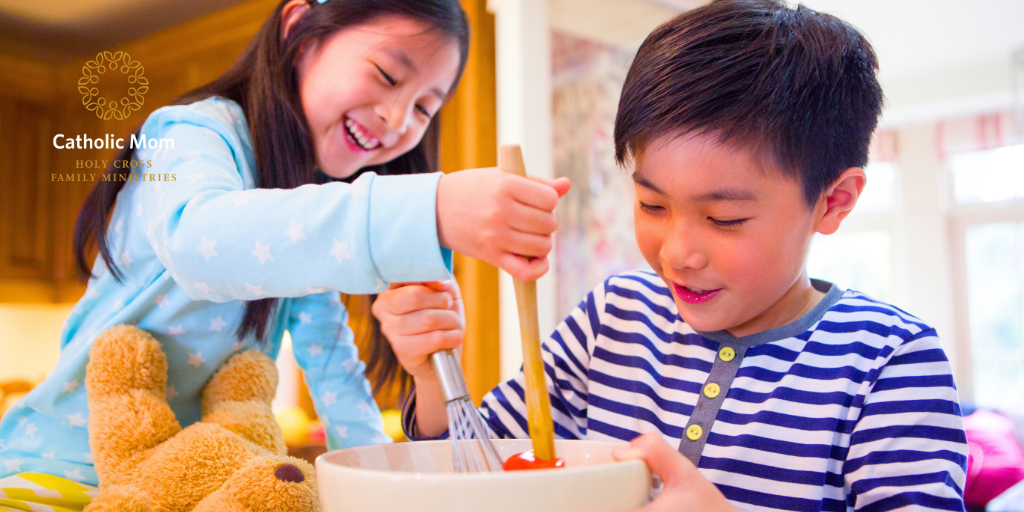
Charisse Tierney outlines the essential elements of her family’s homeschool year using the knowledge she has gained from guiding Montessori classes.
As we prepare for another homeschool year, I am revisiting the essential. What is most important? On our busiest, craziest days, what is the one priority? At the end of the year, what will I look back on as our most cherished memories?
While the academic aspect of our homeschool is important, I can’t answer any of the above questions with math worksheets, science labs, or a complete analysis of a Shakespeare play. Instead, I look at my growing children and take a broader view. I look to myself and the example I set for them every day in our home. I look to God for acceptance of each of these individual human beings for who He created them to be. It is only when I let go of who I think they should be that God is free to shape them into someone far better.
Through my years of Montessori training and educating, I have found (and continue to find) ways to guide children into capable, independent, and responsible people. The following are some Montessori inspired elements I will be nurturing in our homeschool this year.

Environment Sets the Tone
In a Montessori classroom, the prepared environment establishes the tone for everything else. It is the Montessori guide’s job to ensure that materials, furniture, lighting, and decor will help children achieve optimum concentration and zeal for learning. Materials that are beautiful and prepared well lead children toward independent, self-guided learning.
By decluttering and simplifying the material possessions in our home, I can free up space for our homeschool books and supplies to be accessible and appealing. Designated spaces like our home altar can be prepared for peace and prayer, with religious art, saint stories, prayer card-making supplies, and other materials that will direct our thoughts to God. Cleaning supplies, chore charts, cooking supplies, and cookbooks placed in each space where they are needed (for example, a cleaning kit in each bathroom and favorite cookbooks on a shelf in the kitchen) allow everyone to contribute to the order of our home.
Something as simple as a vase of fresh flowers, a scented candle, and beautiful music playing in the background creates a beautiful environment that appeals to the senses and relaxes the mind into receptivity.
Relationships Are Nurtured Through Prayer, Work, and Play
The Montessori environment encourages a constant nurturing of relationships as students take turns using materials, caring for their environment, and preparing snacks and meals together.
Our homeschool nurtures relationships with God and within our family. Visuals in our home that direct our thoughts to God, family prayer time, and liturgical celebrations help us to center our days around God. Family meals (even if we have to schedule a couple of these each week with our busy teenagers), working on chores together, attending Mass as a family, and making time for regular family outings and adventures help us stay connected and remember the joy of secure family bonds.
Grace and Courtesy Take Manners to a New Level
Grace and courtesy in the Montessori classroom include walking carefully around others who are working, allowing others to concentrate on their own work, treating materials with care, and being respectful of people and things. Grace and courtesy guidance are meant to help children grow beyond using good manners out of pure obedience towards the ability to understand circumstances from another’s point of view and act from a place of genuine kindness and empathy. Conversations, role playing, and well-timed gentle reminders (with a good dose of patience) are used in the Montessori classroom to encourage growth in this area.
Grace and courtesy too often fall by the wayside within the comfort of our own home and family members. But the family is the school for love ... and grace and courtesy. What we practice in the home, we carry into the world. By observing my children interact with one another, I can take note of instances when grace and courtesy are lacking. We can have a conversation about these instances and discuss how they might be better handled. If something happens that I would address in my Montessori classroom, then I make the effort to address it in my home as well. Our family bonds are affirmed in the words and actions we use with one another.

When the essentials are in place, academic learning happens with very little effort. A peaceful environment, nurtured relationships, and support and kindness from those around us fill the basic needs of our humanity and allow our homeschool to thrive. I hope that one day we will look back on our homeschool as a place of secure relationships, closeness to God, kindness and respect for one another, and beauty — even on our busiest days.
Share your thoughts with the Catholic Mom community! You'll find the comment box below the author's bio and list of recommended articles.
Copyright 2025 Charisse Tierney
Images: Canva
About the Author

Charisse Tierney
Charisse Tierney lives in Wichita, Kansas, with her husband Rob and seven children. Charisse is a stay-at-home mom, musician, NFP teacher, and a Catechesis of the Good Shepherd catechist. She is also a contributing author to The Catholic Mom's Prayer Companion and Family Foundations magazine. Charisse blogs at Paving the Path to Purity and can be found on Facebook.


.png?width=1806&height=731&name=CatholicMom_hcfm_logo1_pos_871c_2728c%20(002).png)
Comments